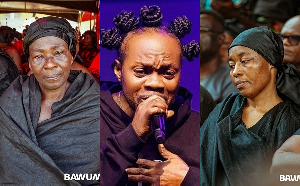Ghana, often hailed as a beacon of democracy in Africa, stands at a critical juncture. While the country has made significant strides in political stability and democratic governance since its transition to multi-party democracy in 1992, it faces mounting challenges that threaten the very foundations of its democratic institutions.
From economic instability and widespread corruption to inefficiencies in the public sector, the need for comprehensive governance and constitutional reforms has never been more urgent.
These reforms are not only necessary to address the pressing issues facing the nation today but are also critical for ensuring long-term political stability, sustainable development, and improved living standards for the people of Ghana.
The State of Governance in Ghana: Challenges and Gaps
Ghana's democratic system, underpinned by its 1992 Constitution, has achieved a lot in terms of political freedom, regular elections, and the peaceful transfer of power. However, the country’s political and governance systems have increasingly shown signs of strain in the face of contemporary challenges. Several factors indicate the need for reforms in governance and the Constitution.
1. Inefficiency and Inaction in Public Institutions
One of the most critical issues undermining Ghana's governance is the inefficiency within the public sector. Key institutions meant to ensure the smooth operation of government, safeguard the rule of law, and enforce regulations, have been hampered by bureaucratic inefficiency and a lack of accountability. For instance, government agencies like the Ghana Education Service (GES), National Health Insurance Scheme (NHIS), and Customs Division of the Ghana Revenue Authority have struggled with delayed service delivery, corruption, and inefficiencies in executing their mandates.
The failure to implement policies effectively, like the Free Senior High School program or the National Health Insurance Scheme, suggests a need for constitutional and institutional reforms that will strengthen the capacity of these institutions to deliver public services effectively.
2. Corruption and Accountability Deficits
Corruption remains one of the most pervasive and destructive problems facing Ghana. From petty bribery to high-level embezzlement, corruption has drained public coffers, hindered development, and eroded public trust in government institutions. In recent years, high-profile scandals, such as the National Cathedral project, which saw millions of dollars spent without tangible results, have intensified calls for accountability and transparency in governance.
Despite the creation of bodies like the Commission on Human Rights and Administrative Justice (CHRAJ), the Office of the Special Prosecutor, and the Internal Audit Agency, there has been insufficient political will and institutional support to tackle corruption head-on. There is a growing need for reforms to strengthen anti-corruption institutions, improve transparency, and hold public officials accountable for their actions.
3. Weak Legislative Oversight
The role of Ghana’s Parliament in overseeing executive actions and holding the government accountable has often been compromised by partisanship, a lack of adequate resources, and limited capacity. A functional democracy requires a strong legislature that actively scrutinizes the policies and actions of the executive. However, Ghana’s legislature has, at times, been accused of failing to critically challenge executive overreach, particularly in matters of public spending and national debt management.
Strengthening parliamentary oversight mechanisms, such as expanding the capacity of parliamentary committees and ensuring the independence of the legislature from executive influence, is essential for ensuring a more balanced and accountable system of governance.
The Need for Constitutional Reforms
The 1992 Constitution, while a significant achievement in Ghana’s democratic history, is not without its shortcomings. Over the years, it has become increasingly apparent that certain provisions within the Constitution are outdated, needlessly complicated, or ill-suited to contemporary challenges. Some areas in need of reform include:
1. Presidential Powers and the 4-Year Term
The concentration of power in the presidency has led to calls for a more balanced system of governance. Ghana’s president holds extensive executive powers, including the ability to appoint key officials, dissolve parliament, and control key aspects of the national budget. While the presidential system has served Ghana well in many respects, it has also led to presidential overreach and a concentration of decision-making in the hands of one individual or party.
Some critics have argued that the four-year presidential term is too short to allow for meaningful long-term planning and implementation of policies. A review of the presidential term and executive powers could ensure a better separation of powers and give more autonomy to the legislature and judiciary.
2. Decentralization and Local Governance
While Ghana has made efforts toward decentralization, the devolution of power to local governments remains inadequate. Local governments, which are closer to the people and better positioned to understand their needs, are still heavily dependent on central government funding and decisions. This centralization of power has undermined the potential of local governance systems to drive regional development.
Reforms to enhance local autonomy, such as increasing the funding and powers of local governments, are critical for improving service delivery and addressing the unique needs of local communities. Furthermore, empowering local councils to manage their resources independently could result in more effective and responsive governance at the grassroots level.
3. Electoral Reforms
Despite Ghana’s reputation for conducting free and fair elections, the electoral system is not without its flaws. Over the years, election-related violence, disputes over voter registration, and issues surrounding the Electoral Commission’s independence have created political instability and reduced public confidence in the electoral process.
To ensure that Ghana's elections remain peaceful and credible, there is a need to revisit the Electoral Commission’s structure and operational independence. Additionally, electoral reforms could include the introduction of an independent body to oversee campaign financing, ensure free and fair media access for all political parties, and improve transparency in the electoral process.
4. Judicial Reforms
Ghana’s judiciary is supposed to be the ultimate arbiter of legal and constitutional disputes. However, the judicial system has sometimes been accused of inefficiency, corruption, and bias. Given the growing demand for legal services and an increasing backlog of cases, the judiciary requires substantial reforms to improve efficiency, transparency, and access to justice. Key reforms could include the digitalization of court records, streamlining judicial appointments, and enhancing the training and development of judicial officers.
Recommendations for Reform
The following are key recommendations for ensuring effective governance and constitutional reforms in Ghana:
1. Review the Constitution: Initiate a comprehensive review of the 1992 Constitution to address issues related to the concentration of presidential power, decentralization, electoral reforms, and judicial independence. This could involve a constitutional reform commission to solicit input from citizens and experts.
2. Strengthen Anti-Corruption Frameworks: Empower bodies like the Office of the Special Prosecutor and CHRAJ with more resources and independence to investigate and prosecute corruption cases. This can be complemented by introducing more stringent anti-corruption laws and fostering a culture of transparency in both the public and private sectors.
3. Enhance the Role of Parliament: Strengthen the oversight functions of Parliament by enhancing the capacity of parliamentary committees and ensuring that MPs have the resources they need to conduct effective investigations into executive actions. Parliamentary reforms should also focus on reducing partisanship and promoting cross-party collaboration.
4. Decentralization: Push for greater decentralization of power by empowering local governments to manage their resources and development plans, thus ensuring more effective and inclusive governance at the grassroots level.
5. Electoral Reforms: Strengthen the independence of the Electoral Commission, increase transparency in voter registration, and adopt measures to prevent election-related violence. Additionally, reforms should focus on ensuring the fair representation of all political parties in the electoral process.
Conclusion
Ghana’s democratic system has served the country well, but it is now clear that substantial governance and constitutional reforms are needed to address contemporary challenges and ensure long-term stability and development.
These reforms should be centered on creating a more balanced and accountable system of governance, enhancing local participation, and fostering greater transparency and inclusiveness in decision-making processes.
Only by addressing these challenges head-on will Ghana be able to build a more robust democratic system that serves the needs and aspirations of all its citizens. The time for reform is now, and the future of Ghana depends on it.
Opinions of Monday, 13 January 2025
Columnist: Dr. Jerome Kpan















